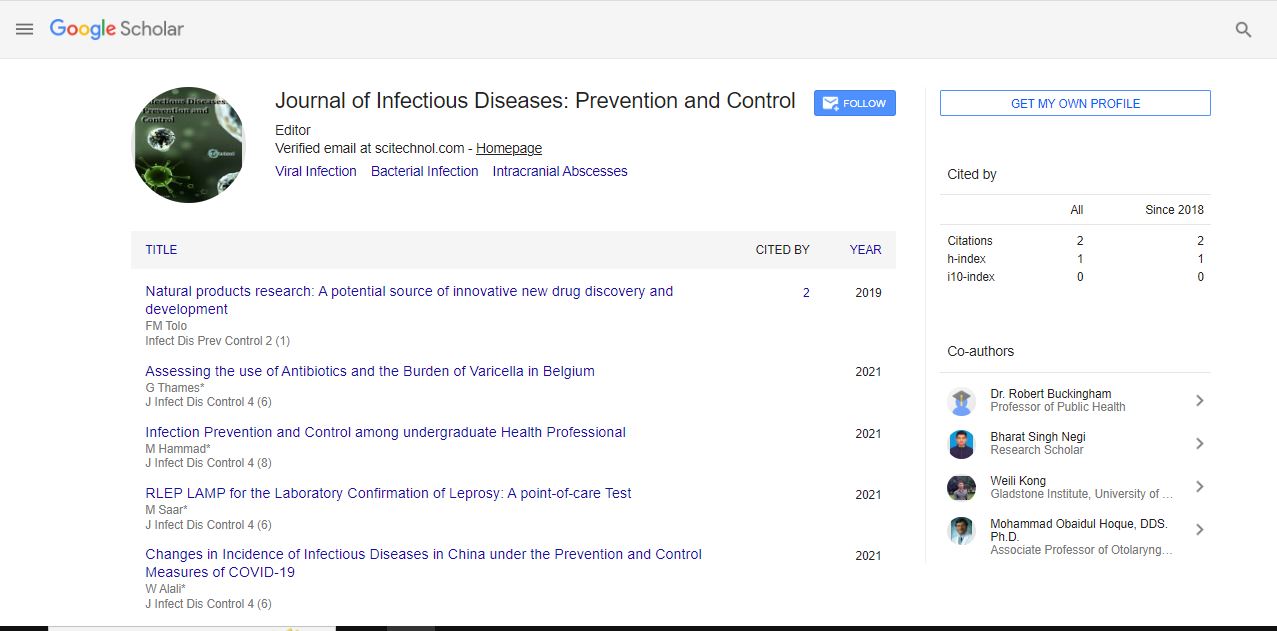Commentary, Vol: 6 Issue: 2
Brief Note on Antibiotics and its Global use for Treatment and Management of Diseases
Nichola Eliza*
1Department of Veterinary Medicine, University of Cambridge, The Old Schools Trinity Lane, Cambridge, UK
*Corresponding Author: Nichola Eliza,
Department of Veterinary Medicine,
University of Cambridge, The Old Schools Trinity Lane Cambridge, UK
E-mail: nichola@eliza42.edu
Received date: 27 May, 2023, Manuscript No. IDPC-23-105443;
Editor assigned date: 29 May, 2023, Pre QC No. IDPC -23-105443(PQ);
Reviewed date: 15 June, 2023, QC No. IDPC -23-105443;
Revised date: 23 June, 2023, Manuscript No. IDPC -23-105443 (R);
Published date: 30 June, 2023, DOI: 10.36648/idpc.5.2.130
Citation: Eliza N (2023) Brief Note on Antibiotics and its Global use for Treatment and Management of Diseases. Infect Dis Prev Control 6:2.
Abstract
Antibiotics have revolutionized the field of medicine by providing effective treatment options for bacterial infections. The discovery, mechanisms of action, resistance development, and the future of antibiotics. It highlights the importance of responsible antibiotic use and the urgent need for novel strategies to combat antibiotic resistance. Understanding the complexities surrounding antibiotics is essential for preserving their efficacy and ensuring a healthier future for humanity
Description
Antibiotics have revolutionized the field of medicine by providing effective treatment options for bacterial infections. The discovery, mechanisms of action, resistance development, and the future of antibiotics. It highlights the importance of responsible antibiotic use and the urgent need for novel strategies to combat antibiotic resistance. Understanding the complexities surrounding antibiotics is essential for preserving their efficacy and ensuring a healthier future for humanity.
Bacterial infections have plagued humanity for centuries, causing significant morbidity and mortality. The discovery of antibiotics represented a landmark breakthrough in the field of medicine, revolutionizing the treatment of infectious diseases. This aims to provide an overview of antibiotics, their mechanisms of action, the development of resistance, and the importance of responsible antibiotic use. By understanding these important elements, we may more fully comprehend the importance of antibiotics and the difficulties they confront in the present day.
The discovery of antibiotics can be attributed to the ground breaking work of Alexander Fleming, who first observed the bactericidal properties of penicillin. Since then, numerous other antibiotics have been discovered, including tetracycline, erythromycin, and ciprofloxacin. These discoveries have created the path for the development of a vast array of antibiotics, each with unique properties and targets.
Antibiotics exert their therapeutic effects through different mechanisms of action. For instance, beta-lactam antibiotics inhibit bacterial cell wall synthesis, while macrolides interfere with protein synthesis. Quinolones target DNA replication, and sulphonamides disrupt folate metabolism. Understanding these mechanisms is crucial for selecting the appropriate antibiotic to combat specific bacterial infections.
The efficacy of antibiotics is in jeopardy due to the worldwide health dilemma of antibiotic resistance. The misuse and overuse of antibiotics have accelerated the development of resistant bacteria, rendering previously effective treatments ineffective. Mechanisms of resistance include the production of enzymes that degrade antibiotics, alterations in target binding sites, and efflux pumps that remove antibiotics from bacterial cells. Urgent measures, such as antibiotic stewardship programs and public education campaigns, are required to combat this growing problem.
To maintain antibiotic efficacy and prevent the evolution of resistance, responsible antibiotic usage is essential. Healthcare providers and patients alike must understand the appropriate indications for antibiotic use, the importance of completing prescribed courses, and the potential consequences of unnecessary or improper use. Antibiotic stewardship programs play an important role in promoting responsible use by implementing guidelines, educating healthcare professionals, and monitoring antibiotic prescribing practices.
To overcome the challenges posed by antibiotic resistance, it is essential to invest in the development of novel antibiotics and alternative treatment strategies. Researchers are exploring innovative approaches, such as bacteriophage therapy, immunotherapies, and antimicrobial peptides. In addition, initiatives to repurpose existing drugs and explore combination therapies are being pursued. It is crucial to continue supporting research and development efforts to ensure a robust pipeline of effective antibiotics for future generations.
Antibiotics have revolutionized the field of medicine, saving countless lives from bacterial infections. However, the emergence of antibiotic resistance poses a significant threat to their efficacy. Responsible antibiotic use, antibiotic stewardship programs, and the development of novel treatment strategies are essential for preserving these life-saving drugs. Efforts from healthcare providers, researchers, policymakers, and the general public are required to address the challenges of antibiotic resistance and ensure a more prosperous future for people.
 Spanish
Spanish  Chinese
Chinese  Russian
Russian  German
German  French
French  Japanese
Japanese  Portuguese
Portuguese  Hindi
Hindi 